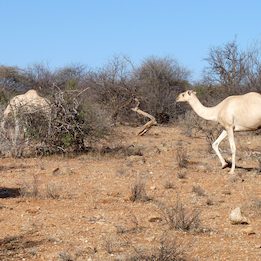Alemayehu Zewdie, Rural Water Supply Utility Technical Advisor with Oxfam, shares his experience working on a project aimed at tackling pasture scarcity in Kenya by promoting peer-to-peer knowledge and skills sharing.
“This activity is one of my best experiences with ASSAR, because this was an opportunity to hear and learn from the local community on the different challenges they have encountered. Conducting the peer-to-peer (P2P) learning activity was a very good and informative process in large part because we communicated with the local community beforehand to hear their voices on different issues. There was clear communication throughout the process regarding their challenges related to pasture scarcity, and they raised many issues related to this problem.
In the P2P learning, we had three main focus areas: camel husbandry, pasture management and customary law of natural resource management (Dedha). What interested me most was to hear about the customary natural resource management designed for different grazing periods, and how farmers using this system are managing the pasture resources and moving to different grazing areas at different times. This is a kind of institution lead by the local community themselves along with elder people who advise the community where to go to graze their livestock. So, this was a good experience for me to hear about the different grazing zones in different periods of the year.
The other interesting thing which I learned personally in the P2P activity is about the different methods used to grow grass and the commitment from the participants to test and grow grass in their areas.
There was huge interest from the participants to take grass seeds and grow them in their areas. In addition to this, there were discussions on herd composition where we learned that grazers are adversely affected by climate change, but browsers are not as affected and that there can be benefits for shifting from grazers to browsers. Learning about this and how committed the participants were to it was another interesting lesson for me. Because the local community understands the impacts of climate change, they are committed to adapt to the shift. I think for me this is another huge lesson from the P2P learning.
Finally, what I learned from this P2P learning in particular and ASSAR in general is that consultation of local communities will give us a better chance to understand their challenges and also there is a huge opportunity to adapt solutions to climate change problems. Another important lesson for me is that there is no single solution to all the problems and that adaptation and customizing the solution according to the situation is also very important.”
First published on ProSus Magazine, June 2019



